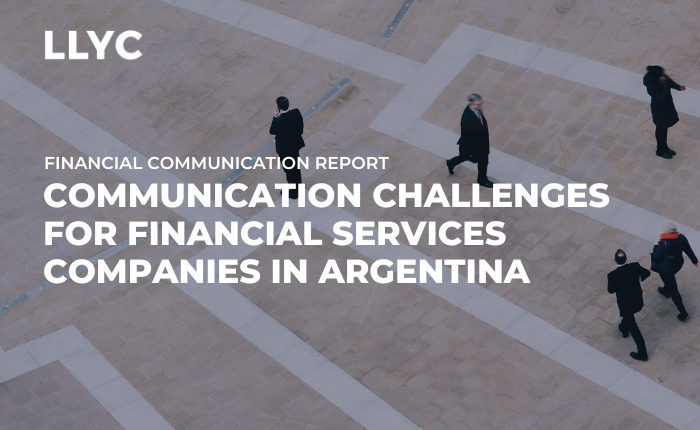-
TrendsPublications and Reports
-
CountriesArgentina
Companies that provide financial services face the challenge of satisfying increasingly demanding users around the world. And Argentina is no stranger to this trend. Thus, customer experience is a central aspect to work on in order to manage reputation and avoid crises that escalate as a result of complaints or comments on networks due to services that users consider deficient. In a local context of extremely high inflation, this erodes customer expectations regarding service and presents a major challenge for companies that provide financial services.
Therefore, financial communication emerges as a key asset that helps financial services companies manage their reputation. The report “Communication Challenges for Financial Services Companies in Argentina“, prepared by LLYC Argentina’s Corporate Communication team, analyzes the main communication challenges faced by companies in the country’s financial sector. Among those that stand out are financial inclusion, the new ecosystem of competitors, regulation and the importance of data protection, without excluding new technologies and the new user profile, increasingly demanding.
“In Argentina, financial services companies face several challenges, from promoting financial inclusion to ensuring data protection, in an increasingly complex business context and where users are becoming more demanding. In this context and through its different variants, communication contributes to building reputation and brand image in the eyes of stakeholders. This report raises the need for tools and strategic allies that allow companies that provide services in this dynamic industry to generate support networks, in order to be able to face the challenges in the best way and adapt to the new market dynamics”, says Luis Migone, Director of Corporate Communications at LLYC Argentina.
In this context, the report addresses the ten main recommendations to be taken into account in order for financial services companies’ communication to be successful:
1. Communication must be a priority and have long-term consistency. It must be included in the company’s business plan from the beginning, transversally to all areas. Moreover, it must be planned with a long-term vision and as an intangible that will add value to the business strategy. For this reason, consistency and recurrence are fundamental.
2. Financial literacy is key to inclusion. One of the barriers to broadening financial inclusion is lack of knowledge and misinformation, which generate distrust. Therefore, it is of vital importance to include in the Communication Plan strategies aimed at educating audiences, in order to pave the way for them to become customers.
3. Create a network of allies to rely on. Knowing the journalists who follow the news in the sector and understanding how the press works is of vital importance. A good media relations plan is key. Likewise, it is important to establish a dialogue with the actors that regulate the financial sector and participate in the debate, making known one’s position based on knowledge of the market, so that it is taken into account when new regulations are drawn up.
4. Communication is also digital. Social networks play an increasingly important role in the reputation of companies. A complaint or comment can escalate, reach the media and become a reputational crisis. It is necessary to understand the concerns and needs of current and potential customers and minimize possible negative impacts to prevent a potential crisis.
5. Anticipation. When an issue occurs that could escalate into a potential crisis, there is no time to build relationships or plan ahead. Therefore, financial services companies must have a crisis plan in advance that allows them to work on the event in all cycles.
6. Internal communication first. Before communicating externally, a company’s first audience is its own employees and, therefore, they should be the first to know about company news or new regulations to be applied. Internal communication must never be forgotten. Success is always a team effort.
7. Hyper-listening. All communication actions should be aimed at getting to know the user better, understanding how he thinks, feels and does, and what his needs and concerns are regarding the financial system. Active listening and timely response to stakeholders’ concerns are essential.
8. Digital transformation is cultural. It is not just about incorporating technology. Financial services companies that aspire to an effective digital mindset must develop communication strategies that are present at all stages of the digital transformation.
9. The user at the center. Financial services companies must develop products and solutions based on user needs. Communication is a strategic ally when it comes to planning and getting to know the customer better.
10. Adaptation, adaptation, adaptation. In a constantly changing and challenging world, financial services companies must develop strategies to sustain their business, innovate and be dynamic in the face of an increasingly complex and demanding customer. Communication tools and strategies are essential for this.
Read the full report here.



